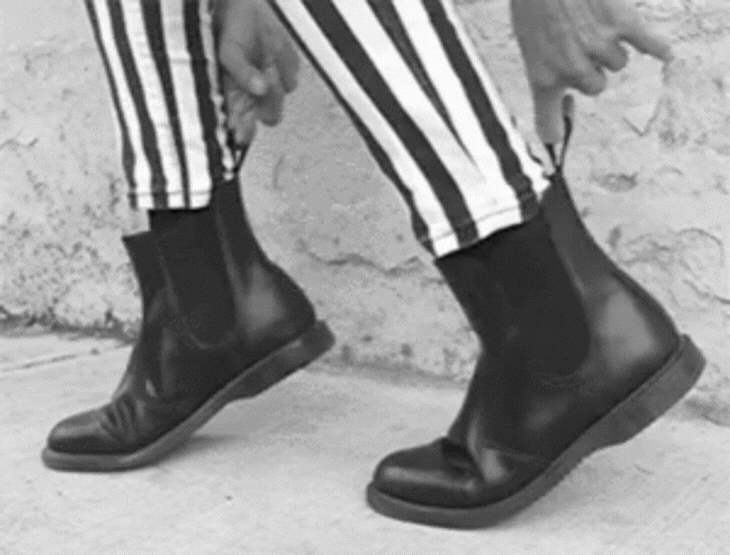A Review and Critique of Alissa Quart's Bootstrapped
The Important Topic of Rugged Individualism Gets Short Shrift in This Myopic Mess
Among certain other qualities, two directives should define the way one contends with a text, work, author, or content creator that grapples with content of an ideological or political nature. This pertains in particular to media or content that one either disagrees with substantially or in part, as it also pertains to that which is anathema to the highest values and first principles. The first is to know thy enemy, as it also behooves the individual to understand the culture and society that envelop him. The second directive is to exercise the faculties of discernment and discrimination with any critical viewing or reading, allowing one to select contentions and observations that have merit, that have certain advantages, while discarding or denouncing that which does not. As with all texts and other works of a political or ideological nature, this reading and critique of Bootstrapped by Alissa Quart employed these two vital directives, as well as the use of resistant reading.

The book is touted as an exploration of rugged individualism—signified by the expression “bootstrapping—and how this legacy has defined the American consciousness, often in ways antithetical to reality. Quart then uses these mostly sound suppositions to advance far-left causes, and very often does so in ways tangentially related to the purported subject of the work. In certain parts more squarely on topic, the book offers what could have been a devastating, irrefutable indictment of this American creed. Unfortunately, the text meanders, wandering off excessively into advocacy for hard-left programs and policy positions, and does so even as the central thesis of the book concerning the myth of rugged individualism is grossly underdeveloped, with much of the topic only barely explored or examined. The book is also peppered with leftist NPC jargon such as “toxic” (an adjective that appears fairly often). The author even characterizes bootstrapping and the self-made man myth as analogous to “being gas-lit” in an abusive relationship. Other turns of phrase indicating the sort of person the reader is dealing with include describing Ralph Waldo Emerson and Henry David Thoreau as “man-alone-splaining” and self-congratulating her talk of “interdependence” as “wondrously centered.” This is joined with effusive praise for Bernie Sanders, Alexandria Ocasio-Cortez, the Biden administration, coupled with a reviling of Donld Trump and a strong aversion to Ronald Reagan.
Despite its many flaws, even in the first part of the book actually worth reading, the beginning of the book does reasonably well in summarizing the myth of rugged individualism, explaining in detail the origins of the idiotic maxim “pulling one’s self up by his bootstraps.” Quart then examines how Ralph Waldo Emerson and Henry David Thoreau established core literary and intellectual foundations to this philosophical and cultural tradition. This is combined with a critique articulating how these literary figures were influenced by and “interdependent” with others.
Perhaps the most worthwhile entry in this text concerns the exposition of Horatio Alger, which was largely if not entirely reproduced in this article in Rolling Stone. It is the interest in this odious figure, and his unfortunate legacy in the American philosophical tradition, to the extent one can call it “philosophical” at all, that drew this author to this text during the final stages of writing and revising “Conservative Dogma and the Student Loan Crisis.” For those unaware, Horatio Alger wrote a series of novellas, the uniform theme of which are young vagabonds and scamps who go from rags to riches. These works were a sort of primordial precursor to young adult fiction, but like some adult fiction today seemed to have been popular among many different age groups. As far as this author can ascertain, Alger’s stories more or less have the same narrative, with only names, backdrop, and incidental details changed. A young man scrapes by in poverty doing menial labor, but does so with a “can-do” attitude, an older wealthy gentlemen takes a shining to the young lad, and through this hard work and favor becomes wealthy and influential himself. As Quart astutely observes, Alger’s boys do not, in fact, “pull themselves up by their bootstraps”—they are helped by an external figure, in the form of a wealthy older man.
As Quart notes and as this author already knew, Alger was credibly accused of pederasty, once with a 13-year-old boy and another time with a 15-year-old. He was allowed to quietly leave town in exchange for his prompt resignation as pastor. Such homosexual pederasty places his literary fixation on young boys going from rags to riches, sponsored by an older, wealthy gentlemen, in a particularly disturbing context. This however has not done nearly enough to impugn and discredit the legacy of Horatio Alger in American society. Much to my chagrin and bewilderment, there is an entity called “The Horatio Alger Association of Distinguished Americans.” As far as I can ascertain, it is not a parody or work of satire, although it certainly ought to be and indeed does read as satire.
The chapters concerning these figures make for worthwhile reading, as is the composite sketch of Ayn Rand and her regrettable influence on American nihilism, particularly on tech moguls. The book also cites important data that belies these myths, including that sixty percent of wealth in this country is inherited, or that most wealthy entrepreneurs come from wealthy or upper middle-class backgrounds. Later chapters of the book delve into structural problems with the American economy that are eviscerating the American middle class, including the obscene health “insurance” industry and surprise medical bills. There is also a chapter on money raising sites, most principally GoFundMe, and how a large contingent of such campaigns are used to pay surprise medical bills, even by those who are “insured.” Much of the content is unneeded and out of place, including an entire chapter on how working for applications like UberEATS and DoorDash do not provide a sustainable livelihood. These and other observations should have been condensed into a chapter or even section discussing the anemic state of the economy since 2001, which would then allow for the text to elaborate on some of the underdeveloped themes and topics enumerated above.
More regrettably, instead of exploring in greater depth the legacy of “rugged individualism” and its many shortcomings and attributes, the author writes at length advocating for many left-wing pet projects, including universal daycare, expansion of Medicaid, and the further decriminalization of illicit drugs.
One of the many low points of the books concerns her interview with a multi-millionaire named Stephen Prince. Prince, a white southerner, made a fortune through a corporate gift card company and is affiliated with a left-wing advocacy group called “Patriotic Millionaires.” He is correct to disabuse himself of the “self-made man” myth and to a lesser extent the “myth of the deserving rich,” but he reveals himself to be a truly contemptible figure when he asserts that he owes his fortune to being white, suggesting that white men collectively enjoy the same advantages he does. He describes others in his multi-millionaire donor class thusly:
These guys think they hit a triple, but the truth is they were just born white in the south.
Obviously, a poor white in Appalachia or the Ozarks, or a young man born to a single mother drug addict and alcoholic has just as much privilege and opportunity as Stephen Prince and other limousine liberals of his kind.
He further states that “what was illegal for a black guy was not illegal for white guys,” particularly his father. He even has the audacity to assert that society should proactively disadvantage white men in the name of equity, stating:
If the jockey is too light, they put more weight in the saddle; the same thing should be true in our society.”
Note he does not, to continue with this remarkably poor analogy, discuss lightening the load of the black jockey, or helping someone unduly disadvantaged because socio-economic factors, a chaotic familial background or the like. Rather the quote involves placing artificial weight on these perceived to have undeserved privileges. Prince, a baby boomer born in 1952, is just the latest example proving the allegations against his generation collectively. This excerpt from his profile on the Patriotic Millionaires webpage might suggest he is a decent guy, a real deep fellow, who understands how the cards are stacked against more and more people:
But the sad reality is that, in America today, “rags to riches” stories like mine are becoming increasingly hard to come by. Over the last half century, as inequality has skyrocketed and the rich take home increasingly larger shares of the nation’s wealth, social mobility has declined dramatically. Research has found that over 90% of children born in the 1940s grew up to earn more than their parents, but only half of kids born today can expect to do the same.
The ridiculous jockey analogy, combined with his obvious condemnation of “white privilege” in all but name demonstrates however that he, like so many others of his kind, has no interest in the betterment and welfare of his posterity and kinfolk. He is another do-goody, ethno-masochist white. And to those who think he simply wants to disgorge wealth only from the top one percent, his blind assertion that he is “for any kind of tax, including the wealth tax” should dispel any disillusions as to what his policies are and what they would do to the shrinking middle class
.
Another interesting aspect of the book is Quart’s assertion that Trump supporters categorically see Donald Trump as a self-made man. Given that his inheritance from his father Fred Trump is common knowledge, I suspect this is grossly embellished, if not distorted outright. There is a difference between admiring and acknowledging how Donald Trump used these advantages to accomplish what he has to entertaining the mad delusion that he is a bootstrapper in the Horatio Alger mold.
There are other troubling elements to the book, including the author’s comparison between The Little House on the Prairie books and the television series it is based on and her effusive praise of feminist author Agnes Smedley, a feminist and communist who had the audacity to assert that prostitutes in the era of westward expansion generally had better outcomes than women who were married and had children.
Quart is also disdainful of white pioneers and what she regards as their pretentions of self-reliance, characterizing the Homestead act as an unprecedent transfer of wealth. Quart complains that the only reason pioneers “could get land at all was due to white homesteading.” She invokes cries of “white privilege” in all but name, either not understanding or refusing to acknowledge how this is simply the benefit of belonging to a collectivized polity and people, in the same way that Japanese enjoy “Japanese privilege” in Japan. It seems Quart is also unfamiliar with the concept of “added value” in matters of economics. The value of the land given had to be cultivated, developed, and harnessed by those pioneers, through hard work, sacrifice, and sometimes death.
The manner in which the history of westward expansion has fueled the mythos surrounding westward expansion is an interesting subject. While it is true the government made these settlements possible, it is also true that American pioneers were less reliant on societal externalities than the way their forebears were for example in Great Britain or Germany. They may not have been free entirely of societal externalities, but were more so than could generally be envisioned in the old world for several centuries. The pioneer era of America and Westward expansion is a fascinating one, and offers fertile ground for intellectual exploration and query into the makings of the American consciousness, both pros and cons. Unfortunately, Quart gives it short shrift in this volume.
One peculiar American phenomenon I often reflect on is how American history explains what Europeans regard as American phoniness and insincerity. Time and again European exchange students will come to the States, surprised and bewildered how friendly everyone is in the beginning. Three weeks later and most if not all of these friendly faces are strangers. Europeans, particularly Germans, are generally more reserved. History explains this difference in national character. In the old world, strangers were often invaders, or at the very least an unknown quantity should be wary of. In American history, pioneers would come settle on a frontier town and were welcome by their fellow compatriots, but then expected to pull their own weight, in the spirit of rugged individualism. This is just one example of many characteristics of the American national character attributed to this legacy that are left unexplored by Quart.
There are other significant flaws in the text, including constant mentions of Covid 19, with no concession whatsoever that such policy was nothing other than hysterical overreaction. The author acknowledges how the Covid pandemic harmed society, but, as with most leftist swine, never thought to consider most covid policy was incredibly harmful to the economy while also being completely unnecessary. These flaws not only limit the appeal of the book, but will leave the book incredibly dated over time, if it is not already.
In addition to under-developed themes of the intellectual and cultural legacy of “rugged individualism,” Quart also misses an opportunity to explore how conservatives and those not aligned with the likes of Bernie Sanders or Ocasio-Cortez exhibit the importance of community and demonstrate—through their behavior and their norms and mores—the importance of interdependence. An exposition of the communal nature of the Amish, as just one example, would have been an interesting counter example to how prevalent rugged individualism is in this country.
These serious flaws and drawbacks notwithstanding, Quart is mostly correct in her critique of self -reliance and the odious legacy of Horatio Alger, at least in terms of how much—but certainly not all—of that critique is presented in the first four chapters. The manner in which she uses this intellectual foundation to advance government programs, universal daycare, a permanent moratorium on evictions, or further decriminalizing illicit narcotics remains nonetheless incredibly short-sighted. Just as she blithely ignores the overwhelming evidence that the response to the Covid pandemic was nothing less than a self-inflicted, slow-burning economic catastrophe, she never thinks that the myriad problems associated with single motherhood and divorce are best addressed not through universal daycare and the like, but by rolling back feminism, tailoring society around pro-natalism, and making efforts to restore the nuclear family. Similarly, her legitimate concerns about the concentration of masses of wealth in increasingly few is detracted by her desire to return an inheritance tax on any amount of $350,000. This and the anti-white rhetoric that she and those of her ilk also want to destroy the white middle class, but in very different ways than Jeff Betis and those if similar ilk.
Much like her mainstream conservative adversaries, leftists like Quart ignore the importance of common blood, race, and soil as a cohesive agent, at least in reference to those of European descent. Indeed, like so many of her persuasion, Quart, asserts that volunteer work should augment and not replace government programs. And she does so while lamenting how countries like Denmark have the expansive government safety net she endorses, either not understanding or acknowledging these countries are largely homogenous (although that is changing since Merkel’s fit of delirium.) Her Jewish identity doubtlessly plays some role in that. This combined with naïve, fantastical allusions about “rugged individualism” and “the self-made man” demonstrate how American society on both sides of the political divide is based on a most unsound foundation.
Despite the significant flaws of this book as a whole, critical readers would be remiss to dispense with its content categorically. To the contrary, resistant reading, combined with the faculties of discrimination and discernment, allow thoughtful readers to incorporate what Quart gets right while understanding and perceiving the great many things she gets wrong. Instead of advocating for such destructive policies as universal daycare or further decriminalizing of illicit drugs, such resistant reading allows readers to see—and incorporate—those few intellectual advantages wielded by the left as well as discern the many structural defects and flaws in mainstream conservatism. This allows the populist right to triangulate the few strengths of the left, and then adopt and modify these strengths to address the many problems plaguing mainstream conservatism.
As for this book specifically, this volume offers some limited insight into the structural defects of these American traditions, philosophical, cultural and sociological, but loses focus in using these observations to advance nefarious policies, leaving the central and most important theme wildly underdeveloped. A few select chapters and excerpts might deserve a respectable rating (three or four out of five stars), but the bulk of the text serves no purpose other than an exposition of the thoughts and intentions of our ideological enemies. Prudent readers are well advised to limit their reading those few chapters (Chapters 1-4), as Chapter 5, containing the interview with Stephen Prince provides an interesting profile of the enemy, but much of the relevant information concerning that has been outlined in this review. A rating of two stars out of five, three out of ten, correctly accounts a weighing of these two countervailing considerations, with only select chapters mentioned above recommended for reading.
PLEASE NOTE: readers who enjoy this content are urged to consider offering a paid or founding member subscription. Readers who enjoy this essay are asked to press the “like emoji” to signify their favor and share with anyone who would find this insightful, interesting, or provocative.
Follow Richard Parker on twitter (or X if one prefers) under the handle (@)astheravencalls. Delete the parentheses, which were added to prevent interference with Substack’s own internal handle system.







